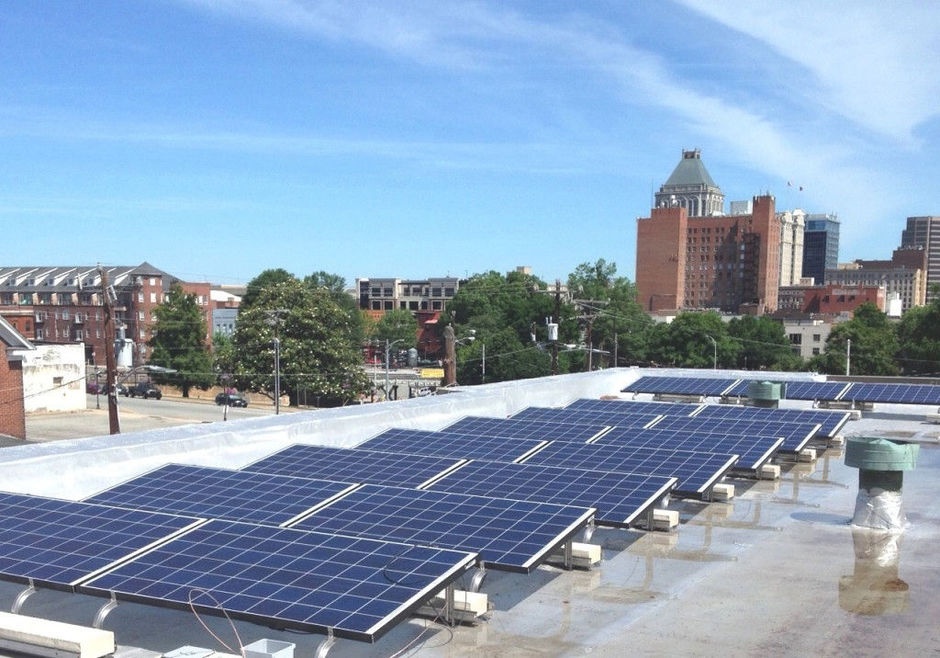Duke Energy seeks $120K fine against nonprofit challenging its solar monopoly

NC WARN installed this solar power system on the roof of a Greensboro church as part of its effort to challenge the state's prohibition on such arrangements. Duke Energy is now asking state regulators to fine the nonprofit and order it to stop selling the power generated by the system back to the church. (Photo courtesy of NC WARN.)
Duke Energy, which last year reported a profit of almost $2 billion, is seeking a $120,000 fine against a nonprofit for trying to undermine the company's solar power sales monopoly in North Carolina.
NC WARN, an energy watchdog group based in Durham, began selling solar power to Faith Community Church in Greensboro back in June after installing a 5.2 kilowatt photovoltaic system on the roof of the predominantly African-American church. North Carolina is one of only four states that do not allow third-party sales of solar power, requiring instead that electricity be sold through a handful of regulated utilities granted monopoly status.
At the time it began selling solar power to the church, NC WARN asked the N.C. Utilities Commission (NCUC) for a declaratory ruling to clarify state policy on third-party sales, which increase access to solar power by allowing customers to pay for rooftop systems over time with no up-front installation costs.
NC WARN argues that the arrangement with Faith Community Church is consistent with state energy policy and the constitutional ban on monopolies. Supporting NC WARN in its case are SolarCity, which is the nation's largest solar company, and other solar providers. It's also been joined by the nonprofit NC Interfaith Power & Light, represented by the Southern Environmental Law Center.
But Duke Energy disagrees with NC WARN and its allies. Last week the company submitted a filing with the NCUC opposing the request for a declaratory ruling and asking regulators to issue a cease and desist order against the nonprofit.
"Instead of waiting for the Commission to rule upon the legality of its scheme … NC WARN has already admitted to generating and selling electricity to its chosen customer," the filing states. "NC WARN's Request must be rejected and its blatant disregard for the law and this Commission's authority should not be condoned."
Duke Energy is also asking the NCUC to require NC WARN to return payments made to it by the church — which the nonprofit says have amounted to "a few hundred bucks" — and to impose civil penalties of up to $1,000 for every day the violation occurred, which in this case could add up to $120,000.
NC WARN issued a press release blasting Duke Energy for seeking a fine and accusing it of retaliating against the relatively small nonprofit for its vocal criticism of the company's fossil fuel-dependent, climate-disrupting business model. In its most recent filing with the IRS, NC WARN reported income of just over $1 million in 2014.
"Duke Energy is entitled to disagree with us," the NC WARN release states, "but seeking to financially hammer this 27 year-old nonprofit is more proof that Goliath wants neither competition, criticism, nor scrutiny."
NC WARN recently petitioned North Carolina Attorney General Roy Cooper to modify Duke's corporate charter to better protect the public from harm caused by the company's pollution, pricing structure and political influence.
The other states where third-party solar sales are not currently allowed under law are Florida, Kentucky and Oklahoma. Georgia was on that list until March, when the legislature passed a bill allowing third-party sales and Gov. Nathan Deal (R) signed it into law.
Florida could also leave that list next year, when the state's voters will weigh in on whether to loosen restrictions on third-party sales. Just last month, the state's Supreme Court approved language for the November ballot.
A bill to allow third-party solar sales was introduced this year in the North Carolina legislature, but it languished in committee. Duke Energy was among the interests that lobbied against it.
Tags
Sue Sturgis
Sue is the former editorial director of Facing South and the Institute for Southern Studies.
